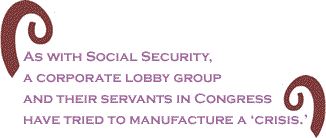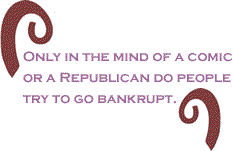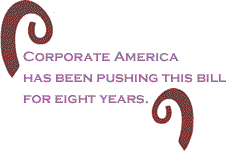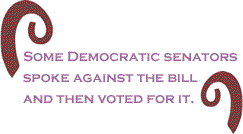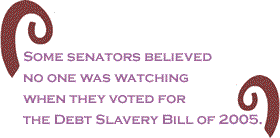
|
|||||||||||||||||||||
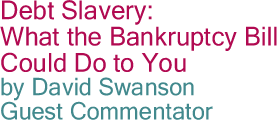 |
The U.S. Senate has passed a dream bill for credit card and financial service companies that, if passed by the House, will land millions of American families in debt slavery. Rather than being able to file for Chapter 7 bankruptcy and make a difficult new start, families and individuals will be placed on long-term payment plans to credit card companies, companies that will take their houses, their cars, their child-support payments, and their paychecks. If you think you're unlikely to land yourself a share-cropping position in this new feudal system, ask yourself if you can be sure that no one in your family will get sick, be injured, die, lose a job, or get divorced. More than one in every 100 adults in America files for bankruptcy each year. If you're a child, the chances of your family filing for bankruptcy are about twice that. (Kids cost money.) These rates have doubled in the past decade. The basic reason that bankruptcies have increased is that personal debt has increased. In fact, in proportion to debt, bankruptcies are actually down. About 50 percent of all families who are forced to file for bankruptcy do so as the result of medical expenses. And three quarters of those have health insurance. Another 40 percent have suffered a death in the family, lost their job, or gotten divorced, or suffered some combination of these factors and medical costs. Almost everyone who files for bankruptcy does so as a last resort. Sixty-one percent of those who do so have gone without medical care that they needed but could not afford. Fifty percent have failed to get prescriptions filled. A third have had their utilities shut off. Twenty-one percent have gone without food. Seven percent have moved their elderly parents to cheaper care facilities. The satirical magazine, The Onion, posted fictional comments on the bankruptcy bill from people in the street, one of which said "Well, there goes my foolproof get-bankrupt-quick scheme!" Only in the mind of a comic or a Republican do people try to go bankrupt. But some Democrats (see below) seem not to be grasping this concept either. After filing for Chapter 7 bankruptcy, you're required to liquidate some assets and pay off what you can. But you are then able to write off the rest of your debt and start over, albeit with a credit record that will make it harder to borrow and sometimes harder to find work. Under the current system, if a judge finds that you have significant assets or income, you can be denied Chapter 7 and be required to enter into Chapter 13 bankruptcy, in which you pay off your debt over a number of years. This current "means test" is conducted by a judge who is able to look at actual income and expenses, as well as to distinguish between someone whose child has diabetes and someone who's been going on reckless shopping sprees.
The bill that is coming up for a vote in the House would create a new means test that would forbid making any such distinctions. It would even forbid comparing what someone actually earns with what they actually have to pay for rent and basic expenses. A court would be forced to use standard government figures for expenses, regardless of what you're actually having to pay. It would base your income on your last six months of income, even if you just got laid off. If your income is below the median, it would spare you the means test but require that you purchase credit counseling, even if you have no money to pay for it and it isn't offered anywhere near your home. It would also require significant new legal expenses and paperwork. But wait, there’s more The problems with this bill could fill an encyclopedia. In fact, the thing is 500 pages of convoluted changes to current law. But, before looking at a few of the details, let's stop and think about the basic idea. Credit card companies, like most lenders, charge interest rates based on the risk they see of each borrower failing to pay back the loan. Some people pay 9 percent on their credit card and others pay 29 percent. The higher rate is supposed to cover the losses the lender will suffer when some of the riskier borrowers default. This system has been bringing in massive record profits for the credit card companies: $30 billion last year. "Here's what's so strange," writes Corinne Cooper, a retired law professor in Arizona, "The credit card companies collect this risk premium, year in and year out. But when the risk actually happens and the borrower cannot pay, the lenders want the Federal government to intervene to force the debtor to pay, by passing a law prohibiting them from filing bankruptcy and discharging the debts. It's as if a life insurance company took premium payments for years and then asked the government to pass a law prohibiting death! Bankruptcy is credit death, and if this bill passes, the courts will be clogged with credit 'zombies' – consumers who can never pay back their debt, and never get rid of it. Why, then, shouldn't the debtor be able to recover all that extra interest paid to cover risk?" So, here we have an extremely profitable industry and a legal system that's basically working. And yet, as with Social Security, a corporate lobby group and their servants in Congress have tried to manufacture a "crisis." In this case, the imaginary crisis is fraud in bankruptcies. As with Social Security, there's a grain of truth that can be found if you dig for it, but the largest problems are being entirely ignored, as are real unrelated crises (such as health care, war, trade, wages, pensions, voting rights, the deficit, etc.). Estimates of cases of abuse of bankruptcy law range from 3 to 10 percent. The non-partisan American Bankruptcy Institute estimates that at most 3 percent of filers – and almost certainly less – are able to discharge debts they could actually pay. But few analysts see this bill (HR 685) as a useful way to go after those abuses. Several have referred to it with such metaphors as "shooting a gnat with an elephant gun."
In fact, an elephant gun would have been useful if someone had known which way to aim it. Corporations have a very easy time filing bankruptcy. CEOs are able to squirrel away fortunes while canceling employees' pensions. Millionaires can file for bankruptcy and keep unlimited amounts of money out of reach in "asset protection trusts" as well as in super-expensive houses. The press secretary for the bill's primary sponsor, Senator Charles Grassley, told the New York Times that "the senator's staff was unaware of the trusts and the loophole for the wealthy that they represented." Uh-huh. These loopholes need not be exploited offshore, as in the olden days. There are a number of states that allow them, regardless of whether the robber baron lives in the state. But the legal costs of setting up "asset protection trusts" place them beyond the reach of most people. Oh, and corporations are allowed to shop for friendly judges from state to state, a right that Congress recently took away from the victims of corporate practices who try to file class action suits. The current bankruptcy bill leaves these millionaires' loopholes in place, although it requires that pirates of industry have purchased their mansions three and a third years prior to bankruptcy if they intend to keep them through the homestead exemption. To watch a spokesperson for this abomination of a bill get taken down by a knowledgeable opponent on CNN, click here. In this interchange, George Mason University's Todd Zywicki is no match for Elizabeth Warren, Leo Gottlieb Professor of Law at Harvard University. These two also testified to the Senate Judiciary Committee, which found Zywicki more convincing. You'll notice, though, that he argues that there is massive fraud without providing any evidence, and at the end is reduced to claiming that it is 10 percent. He starts out trying to use as evidence of fraud simply the fact that bankruptcies are up, combined with a bizarre claim that we're living through an age of widespread prosperity. Excuse me? He points to the stock market as a sign of prosperity, apparently unaware of how many people own little or no stock. Then he points to housing prices having shot through the roof. Zywicki also cites low interest rates. I don't know about you, but my paycheck stretches farther with low interest rates. Sometimes I just pay half the tab at the grocery store. "It's OK," I tell them, "interest rates are low!" Zywicki also mentions low unemployment, which would be relevant if it were true. The hypocrisy The Republicans (and the corporate Democrats) have outdone their usual level of hypocrisy this time. This bankruptcy bill would make it very difficult for a family like Terri Schiavo's to ever get out of debt. It would deny bankruptcy protection to the families of soldiers killed in Iraq or sent to Iraq and away from their jobs and incomes. It would make it very difficult for small business owners who take risks and fail to start over. And it would impose on individuals a standard of fiscal responsibility to which the White House and Congress, not to mention the credit card companies, do not even pretend.
Columnist Robert Scheer notes that Grassley, the bill's sponsor in the Senate, in another bit of hypocrisy "actively opposes abortion and same-sex marriage on biblical grounds yet believes the Good Book's clear definition and condemnation of usury is irrelevant. The Old Testament, revered by Jews, Muslims and Christians alike, mandates debt forgiveness after seven years, as was pointed out earlier this month by an organization of Christian lawyers in a letter to Grassley. 'I can't listen to Christian lawyers,' said the senator, 'because I would be imposing the Bible on a diverse population.'" This would be funny if this bill were going to be easily defeated. It can be defeated in the House if we put our minds to it, and – if need be – put our bodies on the line for it in nonviolent civil disobedience. But this fight won't be easy. Corporate America has been pushing this bill for eight years. It passed both houses of Congress once before and then was vetoed by President Clinton. Two years ago, it passed the Senate, but the House voted it down because the Senate had attached an amendment that would have prevented violent anti-abortion demonstrators from avoiding paying damages to clinics. This time around, the Senate and the Senate Judiciary Committee voted down that amendment and numerous other amendments aimed at making this bill less than utterly disgusting. These included amendments to: – close off the trusts loophole for millionaires, – limit the homestead exemption, – create a minimum homestead exemption to save the homes of the elderly, – protect employees and retirees from corporate practices that deprive them of their earnings and retirement savings when a business files for bankruptcy, – discourage predatory lending practices, – exempt debtors from means testing if their financial problems were caused by identity theft, – limit the amount of interest that can be charged on any extension of credit to 30 percent, – preserve existing bankruptcy protections for individuals experiencing economic distress as caregivers to ill or disabled family members, – exempt debtors whose financial problems were caused by serious medical problems from means testing, – provide protection for medical debt homeowners, – require enhanced disclosure to consumers regarding the consequences of making only minimum required payments in the repayment of credit card debt, and for other purposes, – protect service members and veterans from means testing in bankruptcy, to disallow certain claims by lenders charging usurious interest rates to service members, and to allow service members to exempt property based on the law of the State of their premilitary residence. Each of these amendments was proposed by a Democrat, and each was voted down by the Republican majority. Similar amendments were voted down in the House Judiciary Committee on March 16, including: – An amendment by John Conyers (D-MI) protecting military personnel from predatory payday lenders, – An amendment by Mel Watt (D-NC) exempting tuition costs from the expense calculation in the means test – An amendment by Adam Schiff (D-CA) protecting people whose bankruptcy is due to identity theft – An amendment by Howard Berman (D-CA) protecting bankruptcy filers who file due to medical crises – An amendment by Jerry Nadler (D-NY) which would make debts arising from civil rights violations non-dischargable in bankruptcy. The Democrats
The greatest hypocrisy on this bill may come from the Democrats, who often speak as if they are the party of working people. Some Democratic senators spoke against the bill and then voted for it. One of them, Senator Joe Lieberman, spoke for it and against it, voted for cloture (cutting off debate and moving the bill toward passage) and then voted against the bill. Another, Senator Hillary Clinton, did not vote for or against the bill. Nineteen Democratic Senators voted for the bill, while 24 voted against it. These are the 19 who chose to side with the credit card companies: Sen. Joe Biden (D-Delaware) The Senate Democrats have stood strong and begun to win over moderate Republicans on Social Security. They have blocked judicial appointments. They are not powerless. They chose to let the bankruptcy bill pass. House Democrats are showing glaring signs of weakness, and many of them will back this bill if they don't feel pressure from their constituents to oppose it. The House Judiciary Committee passed the bill, 22-13, with one Democrat, Rep. Rick Boucher of Virginia, joining the majority Republicans to support the legislation. These 20 House Democrats wrote a letter to Speaker Dennis Hastert supporting the bankruptcy bill. The ones with an asterisk have also signed on as co-sponsors of the bill. The first three on the list are members of the Congressional Black Caucus: Rep. Harold E. Ford, Jr. (D-TN) The following Democratic Congress Members did not sign the letter to Hastert but have signed on as co-sponsors of the bill: Rep. Robert E. Andrews (D-NJ) As noted above, Boucher also voted for the bill in the Judiciary Committee. The first obvious explanation for the Democrats' behavior is campaign contributions. And this explanation has even penetrated the corporate media. The New York Times wrote:
To phone, fax, or Email these and other Congress Members to tell them how you feel, go to DebtSlavery.org. At this link you'll find various analyses of the money trail.
The Senators who voted yes received more on average from credit card and financial services companies than did those who voted no. Democrats who voted yes received the most. But, at the same time, some of the Senators and Congress Members supporting the bill have received more money from labor than from credit card and financial services companies. So, why the betrayal of workers? One reason may be that this bill has been the single top agenda item for these companies for years. They've given money specifically for this for years. They wrote the bill and endlessly lobbied for it. The benefits they offer are not merely contributions. In the case of Congressman Jim Moran (D., Va.), MBNA bailed him out of debt with a sweetheart loan in order to win his support for denying others any hope. These companies also offer the possibility of connections to others with wealth, the possibility of well-paid careers after Congress, of the use of company jets, and so forth. And it's not just the financial companies that support this bill. Any corporation that realizes it could someday go the way of Enron, or even K-mart, favors this bill. The US Chamber of Commerce has lobbied for this bill. In contrast, this issue has not been at the top of the agenda for grassroots advocacy groups, for labor, for civil rights groups. It's been on the agenda, but not near the top. Debtslavery.org is working to change that in the next days or weeks, to build pressure on Congress Members, Democratic and Republican alike, to oppose this bill. "Why did we lose so many votes on cloture on such an awful, venal piece of legislation?" a House Democratic staffer asked rhetorically on DailyKos.
The Democrats also organize into New Democrats and Blue Dog Democrats to build strength as the Republican Wing of the Democratic Party. After David Sirota, a fellow at the Center for American Progress (CAP), sent out an Email accusing 16 of the 20 House Democrats who had written to Hastert of doing so because of money they'd received from credit card and financial services companies, CAP President John Podesta, in the words of The Hill newspaper, "faced pointed questions from lawmakers at [a] New Democrat Coalition (NDC) meeting.... Nearly every lawmaker who arrived ... voiced concern about the Sirota broadside, calling it overtly personal and unhelpful to the two organizations' shared goal of helping the Democratic Party grow.... Some participants said they were looking for more contrition than they received from Podesta and wanted assurances that his organization would abstain from attacking centrist Democrats for their pro-business stances." Congressional Black Caucus Member Artur Davis (D-Ala.), had this to say:
The media It's also possible that some senators believed no one was watching when they voted for the Debt Slavery Bill of 2005. The media coverage has been nowhere near that of the Social Security "crisis," much less Terri Schiavo. There's been very little on the airwaves, and only relatively more in print. But the media has not done nearly as bad a job on this as it's done on a long list of other issues. Numerous opinion pieces have denounced this bill with unbridled fury at the cruelty and arrogance it embodies. And some of the news articles have been fairly decent as well. One gets the impression that what 19 Democratic Senators were able to stomach, some editors and journalists are unable to. Of course, what coverage there has been has been limited by the media's childish understanding of "balance," as exhibited in the video clip above. Print articles, similarly, present two views from two sources (never one or three), without including information of which of the claims made have evidence behind them. Of course, some pieces of information that are considered neutral, such as the increase in bankruptcy filings, are presented directly by the journalist as factual, but the cause of that increase and other contested points are off-limits for actual reporting because they are contested. While the New York Times and the Washington Post and others have produced some good and lengthy articles, often these articles are framed with poor headlines and leads that obscure the important information. Short, one-paragraph stories on this issue have been, as usual, more misleading than the longer ones. And why have there been no opinion polls? But in every aspect, the media has out-performed its usual miserable standard.
The media has, in a move that is always damaging to democracy, reported too heavily on the horse race, predicting a near certain passage of the bill, predicting a last-minute surge in filings before it's enacted, and praising the Republicans for being winners, even when acknowledging that their bill will hurt millions of people. Here's how Newsweek summed things up:
Not just ordinary readers, but Democratic Party strategists will look at something like that and decide that the solution is to move even closer to the Republicans, because they are winners. Here's a typically misleading lead to an article from Newhouse News Service:
Here's an excerpt from the San Antonio Express News that builds on a myth that credit card companies would lower their rates on the rest of us if some of their customers weren't sneaking out of their debt:
While those comments went uncritically reported in the media, other voices were heard in the progressive and "mainstream" media. WashingtonPost.com has done a good and more honest job of presenting information originally reported in the print version of the paper.
The editor of Fortune Magazine, Andy Serwer, has done even better. He wrote:
Even the New Republic's Noam Scheiber suffered an outbreak of populism, writing:
All I can say is, let's hope so! Taking action To learn more, to contact your Congress Member, and to find out what else you can do, visit http://www.debtslavery.org. If the bankruptcy bill passes, watch for what's coming next: A federal bill to destroy all state restrictions on predatory lending and changes to weaken the Community Reinvestment Act, If you want to stop those, stop this one! David Swanson works for DebtSlavery.org, a coalition founded by Democrats.com, Progressive Democrats of America, and People's Email Network. |
Your comments are always welcome. Visit the Contact Us page to send e-Mail or Feedback or Click here to send e-Mail to [email protected] e-Mail re-print notice
If you send us an e-Mail message we may publish all or part of it, unless you tell us it is not for publication. You may also request that we withhold your name. Thank you very much for your readership. |
| March 31 2005 Issue 132 |
|||||||||
|
|||||||||
|
|
|||||||||
| Printer Friendly Version | |||||||||
 |
|||||||||
 |
|||||||||
| |
|||||||||
| |
|||||||||





















